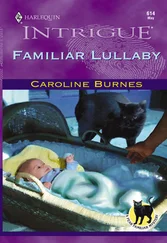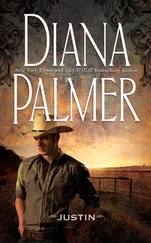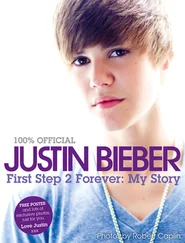And then they were inside.
Bodies moved aside to let them through. Cross stopped and reached his arms above his head while someone lifted off his sweatshirt. A woman ran her fingers through his hair, tilted his head back, and drew lines beneath his eyes. Thirty feet away a wedge of white light split a heavy curtain; in the middle of this opening a crew member stood holding a steel guitar.
Peter perceived that this choreography was taking place in utter silence, in monastic quiet. He couldn’t hear what Bluto shouted into Cross’s ear or what the makeup artist said as she brushed color across Cross’s cheeks. He couldn’t even hear the thoughts in his own head. Everything was obliterated by the deafening silence, which, Peter noticed, seemed to cycle and hum, seemed to reach him through the air and through the floor, seemed to emanate from someplace inside his body.
Cross walked over to the curtain and took the guitar from the tech. His left hand held a bullwhip — no, it was a coiled black cord.
Peter noticed a pale woman, a pale, freckled woman, her orange, Pre-Raphaelite hair held in place by an elastic cord. She held her hands over her ears. She might have been laughing. Or screaming.
She leaned toward Peter suddenly, as though trying to bite him. Her nose brushed against his ear.
“Pinchme!”
He squeezed her elbow.
Her eyes, he would swear, shot green sparks.
Bluto’s assistant, Wayne, appeared before him holding a laminated pass for Peter’s inspection. Cross’s name flashed across the top in silver, beneath it, in blaze orange, the word “crew.” Wayne looped the lanyard over Peter’s head.
As Peter watched, Cross shoved the neck of his guitar toward the floor — the body of the instrument swung up to cover his back like a shield. He strode through the curtains, while above the roar an omnipotent voice announced, “Ladies and gentlemen, please help me welcome eleven-time Grammy-winner, Kellogg recording artist Jim Cross.”
PETER HAD NO musical aptitude. He’d never picked up a cheap guitar in order to impress a girl. While he recognized the names of the bands that were supposed to mean something to him, he couldn’t recall what made them important. In high school he’d preferred to listen to musical parodies. Standing at the side of the stage, his defenses were overrun. The music invaded him. Was it possible he’d never heard music before?
Jimmy stood both at the center of the stage and at the center of the music. Now and again he’d turn to one of the guys in his band and let his guitar say something quick and sharp. When Jimmy sang, he didn’t lean into the mic — he came at it sidelong, as though he had to get in the last word. Peter noticed how Albert built a floor for the others to play on, that Dom delineated vertical spaces with the bass, or so it seemed. People called Jimmy “the Court Jester,” but onstage Sutliff filled that role: he prodded his lap steel like a boy teasing a snake with a stick — every so often he’d throw his shoulders back, as though the instrument had taken a swipe at him. Peter wanted to share these observations with someone. But who? Not Bluto, who, even when he stood still, managed to convey that his attention lay elsewhere, that he shouldn’t be bothered. And Cyril? The bodyguard stood still, one hand cupped over the microphone on his headset, his eyes never still, always roving.
When Peter searched for the orange-haired woman, she was gone.
IN THE MIDDLE of a song, a crowd of people materialized around the doctor. Among these people — no, not among, at their nucleus — stood Cross.
Cross hooked a damp hand around Peter’s neck, drawing their heads together, a clinch. “You need to meet someone.” The singer had a distinct, iron smell, like something wrapped in butcher paper.
Peter fell in step with Cross. The singer’s attendants trailed behind them, crows chasing a hawk. A door opened before them and they entered an intimate domestic space, like the parlor of a winterized Victorian mansion, a loveseat, a few armchairs, all draped in white sheets. Cross’s entourage had disappeared.
“Who goes there?” said the loveseat.
A man in canvas pants, an untucked oxford tented over his stomach, lay diagonally across the cushions so that his knees dangled off one side. He had on beetle-black sunglasses; a series of rubber bands trained a full beard into something like a pharaoh would wear. A thread of smoke rose from the ebony cigarette holder staked in the corner of his mouth.
“Peter,” Cross said, “I’d like you to meet my son, Alistair.”
Cross’s son pulled his sunglasses down his nose, then tilted his head back so he was looking at Peter. “Excuse me if I don’t get up.”
“Allie’s back is bothering him,” explained Cross.
“It’s attacking me,” said Alistair.
“Do you want me to take a look?” Peter addressed his question to the room.
At the end of the cigarette holder, a twist of paper sizzled.
“I ought to get back to the office,” said Cross, putting his hand on the door. “Take Peter up on his offer. Maybe he can help.”
“Go make your widgets.”
Cross said, “We’re both terrible patients,” before opening the door.
Music raced into the room, but when the door latched the sound that had been trapped in the room collapsed.
Alistair extended a hand toward Peter and the doctor pulled him to his feet. “Where’d you do med school?”
“North Carolina.”
“Is that code for Duke?”
“No.”
“UNC?”
“Nope.”
Alistair shuffled over to a banquet table piled with cellophane-coned bouquets, twelve cans of Diet Coke, an ice bucket, a tower of clear plastic cups, a stack of white towels, and an unopened box of tissues. The singer’s son scooped ice into a cup. Turning, he said, “You haven’t spied a refrigerator, have you?”
Peter pointed to where an extension cord snaked under the table.
Gripping the table’s edge, Cross’s son lowered himself, a geriatric swimmer descending into a pool. When he was kneeling, he pushed aside the table’s skirting, revealing a mini-fridge. “Bingo!” He retrieved a Snickers bar and a liter of Smirnoff vodka, setting them on the table.
“What’d you do to yourself?”
A bloom of perspiration appeared on Alistair’s forehead. He filled his cup halfway with vodka. “I fell out of a samlor on my way to the Phulay Bay Ritz, where a friend awaited me in La Perla and coconut oil.”
“Are you taking anything for the pain?”
Cross’s son raised his glass. “It’s not usually this bad. I caught a flight out of Charles de Gaulle this morning, which was tolerable, but to get here I hopped one of those rectal thermometers the regional carriers use.”
Peter kept his face expressionless. “So you self-medicate.”
Cross’s son lowered himself onto the loveseat. “I used to work with this physical therapist who overhauled my diet. Rye bread instead of rye whiskey. Bananas without whipped cream. Coffee without Percocet. Real ‘Eye of the Tiger’ shit.”
The story was designed to get Peter to ask what had happened — Alistair would offer either a humorous or a tragic explanation for why a thirty-year-old man had the muscle tone of a paté. Rather than play his assigned role, Peter said, “Did your father expect you at dinner tonight?”
Alistair unwrapped the Snickers bar and bit it in half. He chewed. “What did you talk about?”
“He said he thought you could have been a doctor.”
Cross’s son started coughing. He held his cup at arm’s length, but there was a damp stain on his shirt. “You’re messing with me. He told you I could have been a doctor? That’s crazy. I guess he forgot how I barely finished high school.”
Читать дальше












